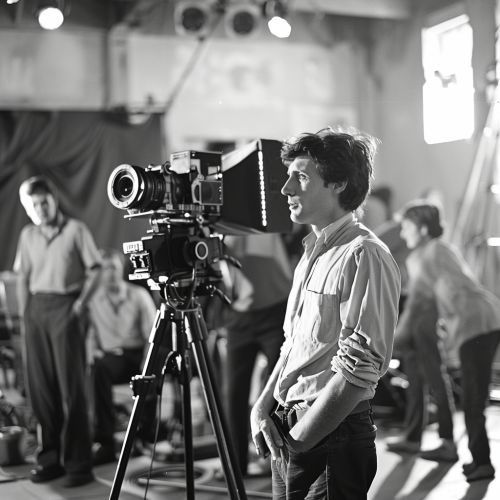Eric Rohmer
Early Life and Education
Jean-Marie Maurice Schérer, better known by his pseudonym Eric Rohmer, was born on March 21, 1920, in Tulle, France. Rohmer's early life was marked by a strong academic inclination, which led him to pursue studies in history and literature. He attended the Lycée Henri-IV in Paris, where he developed a profound interest in classical literature and philosophy. This academic background would later inform his approach to filmmaking, characterized by a deep engagement with literary and philosophical themes.
Career Beginnings
Rohmer's initial foray into the world of cinema was not as a filmmaker but as a critic. In the early 1950s, he became associated with the influential film magazine Cahiers du Cinéma, where he worked alongside future luminaries of the French New Wave, such as François Truffaut, Jean-Luc Godard, and Claude Chabrol. His critical writings were distinguished by their rigorous analysis and theoretical depth, often focusing on the moral and ethical dimensions of cinema.
Transition to Filmmaking
Rohmer's transition from criticism to filmmaking began with a series of short films in the late 1950s. His first feature-length film, "Le Signe du Lion" (1959), did not achieve commercial success but was notable for its existential themes and meticulous attention to detail. It was during this period that Rohmer began to develop his distinctive cinematic style, characterized by naturalistic dialogue, minimalistic mise-en-scène, and an emphasis on the moral and ethical dilemmas faced by his characters.
The Six Moral Tales
Rohmer's breakthrough came with the series "Six Moral Tales" (1962-1972), a collection of films that explore the complexities of human relationships and moral choices. The series includes "La Boulangère de Monceau" (1963), "La Carrière de Suzanne" (1963), "Ma Nuit chez Maud" (1969), "La Collectionneuse" (1967), "Le Genou de Claire" (1970), and "L'Amour l'après-midi" (1972). Each film in the series is structured around a central moral dilemma, often involving themes of temptation, fidelity, and self-deception.
Stylistic and Thematic Elements
Rohmer's films are renowned for their intellectual rigor and philosophical depth. His characters often engage in lengthy, introspective conversations that reveal their inner conflicts and ethical quandaries. The dialogue is carefully crafted to reflect the characters' psychological states and moral perspectives. Rohmer's use of natural lighting and real locations further enhances the realism of his films, creating a sense of intimacy and immediacy.
Later Works
Following the success of the "Six Moral Tales," Rohmer embarked on several other film series, including the "Comedies and Proverbs" (1981-1987) and the "Tales of the Four Seasons" (1990-1998). Each series continued to explore themes of love, desire, and morality, but with a greater emphasis on humor and irony. Notable films from these periods include "Pauline à la plage" (1983), "Le Rayon vert" (1986), and "Conte d'été" (1996).
Legacy and Influence
Eric Rohmer's influence on contemporary cinema is profound and far-reaching. His films have been praised for their intellectual depth, moral complexity, and stylistic innovation. Rohmer's work has inspired a generation of filmmakers, including Richard Linklater, Noah Baumbach, and Wes Anderson, who have cited his films as significant influences on their own work.
Personal Life
Despite his public persona as a filmmaker and critic, Rohmer was known for his reclusive nature. He rarely gave interviews and maintained a strict separation between his personal and professional lives. Rohmer's private life remains largely undocumented, contributing to the enigmatic aura that surrounds his persona.
Death and Posthumous Recognition
Eric Rohmer passed away on January 11, 2010, in Paris, France. His death marked the end of an era in French cinema, but his films continue to be celebrated for their timeless exploration of human nature and moral complexity. Posthumously, Rohmer has been the subject of numerous retrospectives and academic studies, further cementing his status as one of the most important filmmakers of the 20th century.
See Also
- French New Wave
- François Truffaut
- Jean-Luc Godard
- Claude Chabrol
- Cahiers du Cinéma
- Naturalism (theatre)
- Moral Dilemma
- Existentialism
Categories


